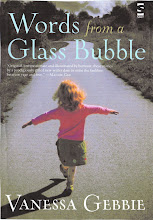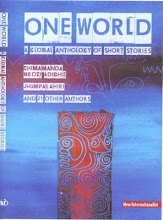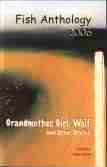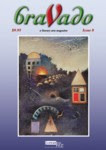

What links a café in Antarctica, a factory for producing electronic tracking tags and a casino where gamblers can wager their shoes? They're among the multiple venues where award-winning writer Tania Hershman sets her unique tales in this spellbinding debut collection.
So says Tania's blurb, on the Salt Publishing website.
I am delighted to be the next stop in her Cyclone Blog Tour, and my subject is one very dear to my own heart...
MAGICAL REALISM IN THE WHITE ROAD
Hi Tania!
I remember the first time I read your work. It was a tiny flash piece called Plaits, and I am delighted to see it included in The White Road and other Stories. I know I responded to that piece with both delight and understanding. Here was another writer who 'saw things a bit differently', to put it in the simplest of terms.
Many of your characters seem to inhabit a recognisable world, but you endow them with the skill to transcend it. And the reader is transported with them. In Plaits, we believe totally that a relationship hangs on the length of a woman's hair, and that her knees are her confidantes - advisors.
In the title story, we believe totally that a simple woman would go literally to the ends of the earth to escape the deepest of sadnesses. And we believe that the action she takes towards the end of the story is real. (I don't want to do a spoiler!).
And it is so with so many of your stories. Not for a moment do I doubt the 'truth' that underpins each story.
Three multiple questions:
1) Can you tell me whether your work fits broadly into the school of Magical Realism? If so can you define it as you see it, and give us a few examples of Magical Realist writers who have influenced your work??
First, thank you, Vanessa, for that wonderful introduction. It means a lot that you find my stories believable, you are willing to step into the worlds of my characters and accept what happens there as their “truth”.
I do love Magical Realism and I would like to see some of my stories as falling under this heading. I think that the name, Magical Realism, is already thrilling – you are taking something which we might call “real” and add a dash of magic, something otherworldly. For me, this is why I read – I want to be lifted out of the everyday, out of the world I know, and be shown something new, something other.
I do want to mention, though, that only some of the stories in my book would be called magical realist, and that this isn't something I set out consciously to do. Much like you, I imagine, I just follow where the story leads me. If, as happened with the story Rainstiffness, I hear the first line in my head: “When it rains, she stiffens”, I just go with it and am not put off, made nervous by the fact that actually my main character is semi-paralyzed during rainstorms, something I have not heard of happening in “real life”. Many of my stories are far more realist, whatever that means, some are perhaps more in the science fiction realm – not realist enough to be even magical realism. What I am trying to say is that I believe in doing whatever serves a particular story, rather than setting out to write a piece of magical realism. I follow my characters, see what they do, see why they do it, and if it is something odd, something bizarre, something otherwordly – such as a rabbi meeting an angel in a car park, or two small boys who are afraid that one of them is going to explode - I am open to that. I would like to think I am open to anything my characters might do!
So what exactly is magical realism? I looked up several definitions: the most basic is that it is realism with a twist. This means there is some overlap with science fiction, speculative fiction, slipstream – but this is fiction firmly set in the world as we know it, not on other worlds or planets. The “magic” may only be something like, as you mentioned, a story in which a woman has conversations with her knees or, in your wonderful story, Words from a Glass Bubble, the talking statue of the Virgin Mary. Or, as in Like Water for Chocolate, by Laura Esquivel, a rather grander example in which food has an effect on the eater depending upon the emotions of the cook.
I like to read magical realist stories because they make me think more than a story in which every element is familiar. I am not particularly interested in a story about someone like me, who lives where I live, does what I do. I want to learn something from a story, and one way to draw me in as a reader is to invent something completely new! If you convince me, I will step into that world, I will accept it all, I will be right there with your characters. If you don't convince me, I stop reading.
Some of my favourite writers in this vein are Angela Carter, Aimee Bender, Italo Calvino, Hariko Murakami, Jose Saramago. These writers inspire and influence me by saying that anything is possible. Their work says to me: Don't be constrained by what you have seen, what you have experienced. Go beyond your world, use your imagination, see what might be, what could be.
This is not done simply for entertainment value: the best magical realist stories use the magical aspects to unveil something about our own world, our communities and societies, who we are as human beings. In Aimee Bender's beautiful story Dearth, from her collection Willful Creatures, a woman comes to love potatoes that grow hands and feet. This is an achingly moving story about loneliness and connection, attachment and loss. It is not about animate vegetables.
2) Why is Magical Realism effective? What does it do that straight realistic storytelling can't do? My take is that it leads the reader to see life through a prism, and makes them look back at simple events and reappraise thanks to the new layer of 'sight' the writer lends them. And that post-reading, the reader is left with something that resonates. Things are never quite as predictable afterwards. Debate!
Exactly! Oh sorry, does “debate” mean I have to disagree? Well, if you take the example I gave above, Bender could have attempted a story with a similar theme by showing us how lonely her main character was and having her trying to have a baby, find a boyfriend, something “mundane”, something familiar to most of us. By freeing us from the bonds of our world and asking us to accept that the potatoes can acquire human attributes, what she does is release something in us. She forces us out of our comfort zone, asking us to stretch our imagination “muscle”, flex it and exercise it. A well-toned imagination muscle gives us something, perhaps what you called a new layer of “sight”. We see the magical in the everyday, we are open to other possibilities, we are less rigid.
This discussion has led me to thinking about some of the wondrous books I read as a child: the Phoenix and the Carpet by E Nesbit was one of my favourites. So much of children's fiction could, I think, fall under the Magical Realist heading: our world, plus the addition of a talking phoenix and a magic carpet. I devoured these books, I loved the idea of the magical, and why should we grow out of that? The success of television series such as Heroes is a clear demonstration that we long for there to be more to this life, answers to the unexplainable, delight and wonder, untapped potential deep inside all of us.
3) Do you think that Magical Realism has anything to do with our innate search to explain the unexplainable? Does it go back to the dawn of time, when people sat round their fires and sought to explain the movement of the sun moon and stars through explaining those movements in 'Realistic' stories, thereby creating a mix of fantastical and familiar, all that time ago? You are a scientist by training. One might think that the search for fact would negate the very magical elements that come out in your work. How do you reconcile the two?
Most definitely. One of the definitions I found for magical realism said, when talking about Gabriel Garcia Marquez, one of the leading magical realist authors: “Magical realism expands the categorizes of the real so as to encompass myth, magic and other extraordinary phenomena in Nature or experience.” Many see magical realism as having Latin American roots, although it has now spread further afield. Yes, I see it as coming from a desire to understand, to explain the world around us, to fill in the gaps.
And this could equally be a description of science, no? Science is about explanation, understanding. And much of science requires scientists to suspend their disbelief, to accept the existence of the unseen, phenomena we cannot touch or feel. For example, quantum physics postulates that our tangible physical world is in fact mostly subatomic particles whizzing around in empty space. That doesn't fit with what our hands, our eyes are telling us.
Particle physics, which I studied at university, always felt to me like some type of science fiction: we can't “see” any of the particles the physicists believe exist – quarks, neutrinos, the Higgs boson - they are too small to be measured by any of today's instrumentation. We can only follow their trails through our world and see where they might have been and what effects they caused.
Scientists use their imagination to “probe” below the surface. How much more imaginative can you get than String Theory: we are all fundamentally made of tiny vibrating strings! But science is based on experimentation and proof, so it is not just enough to have a theory, you must design experiments to attempt to prove or disprove it. Well, actually, nothing can ever be proven to be true: in science there is no absolute truth: there is only the “best fit theory” that has yet to be proved wrong. I also studied Philosophy of Science and was deeply impressed by the logical argument about White Swans and Black Swans: just because up until this point in your life you have only seen White Swans, don't assume Black Swans don't exist. What a healthy attitude towards all of life: expect the unexpected, don't assume you know it all, have seen it all.
Scientists are always searching for the Theory of Everything, the “rules” which will completely explain our world, but all along the road is the debris of theories that were once believed and then proved wrong. Science is dynamic, always on the move, creative, magical. Scientist are always asking “What if...?”. So do fiction writers. Just pick up a copy of New Scientist, for example. Some of the reports on the research that is being carried out sounds more like fiction than fact!
Studying physics taught me that curiosity is a virtue, that asking questions is vital. I may not have continued on into a career in the lab, but I hope I never stop wondering, never stop asking questions.
Thank you so much for having me on your blog and asking me questions!
Next stop on the Virtual Book Tour: Nov 18th, Sue Guiney's Blog
Previous stops on the tour: Literary Minded
, Keeper of the Snails
For more information about Tania's Walking the White Road Virtual book tour, visit HERE!





.JPG)























6 comments:
Very interesting interview - questions and answers...excellent weirdness (and I mean that as a compliment!)
Excellent weirdness - what an excellent comment! Thanks for stopping by, Clare. It's fun, this virtual touring!
Thanks for this, Vanessa, and Tania. It never fails to astound me, Tania, how you started at a point where I feel no empathy or understanding (I'm talking about science at which I was and am a dunce) and from there wove such wonderful words and stories for which I feel SUCH a connection. Astounding.
This is a great piece, Vanessa and Tania. Thank you. I love that quote about the imagination as a muscle, and used it in my creative writing class this morning! Plaits is a good story - one of my favourites in the collection.
Sarah, thank you, that means a lot to me, connection is what I guess we are all striving for with this.
Lynne and Sarah (which one of you??), how lovely that I have already been quoted! Thank you!
That weaving together of science and fiction (though not science fiction) reminds me a bit of Primo Levi.
Like Sarah Hilary, my knowledge of science is sketchy at best, but you (and Clare BTW) have a way of drawing in the most science-challenged of readers and making the subject appear fascinating and packed with potential.
Post a Comment